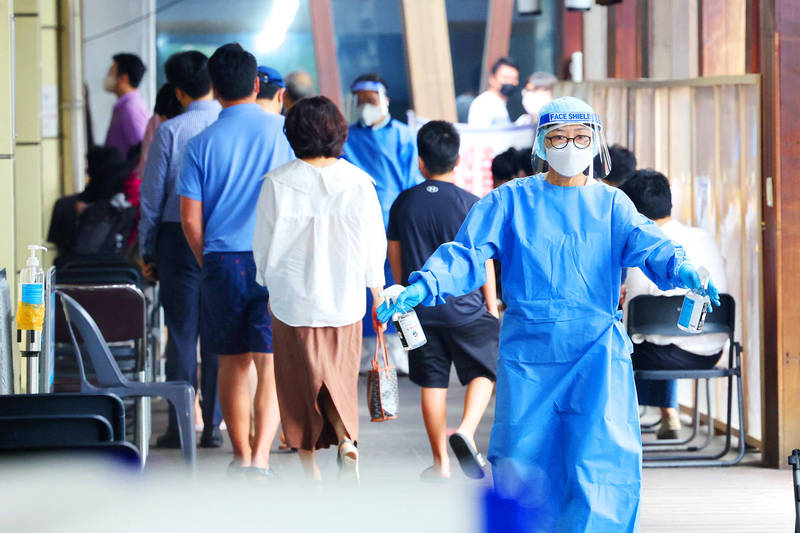《TAIPEI TIMES》 Taiwan could face another COVID-19 wave next month

A medical worker disinfects a screening clinic for COVID-19 tests in Songpa Ward, Seoul, yesterday. Photo: EPA-EFE
By Shelley Shan / Staff reporter
Taiwan is likely to face another wave of COVID-19 infections next month or in September, but it is unlikely to see a rapid surge in cases, the Central Epidemic Command Center (CECC) said yesterday.
The center reported 27,684 new cases yesterday — down 12 percent from a week earlier — and 89 deaths.
Yesterday was the first day that the government allowed citizens, resident certificate holders and transit passengers to board flights to Taiwan without having to present a negative polymerase chain reaction (PCR) test result.
Some were concerned that the new policy could lead to a domestic outbreak of BA.4 or BA.5, two dominant and more contagious Omicron subvariants of SARS-CoV-2 that have caused a resurgence of COVID-19 cases in Singapore, New Zealand and other countries.
The number of COVID-19 cases in Taiwan has been declining at a weekly rate of 10 to 15 percent, said Center of Disease Control Deputy Director-General Chuang Jen-hsiang (莊人祥), the CECC’s spokesman.
“While many have predicted that another outbreak caused by the BA.4 or BA.5 subvariants could occur next month or in September, there should not be a dramatic increase of COVID-19 cases if the downward trend continues,” Chuang said.
“A majority of the public have had a booster shot of a COVID-19 vaccine, and select groups are about to receive their fourth dose,” he said. “The country is experiencing a BA.2-induced outbreak that began in May. We believe that the community immunity could last for some time.”
National Taiwan University Children’s Hospital superintendent Huang Li-min (黃立民) told the Chinese-language Apple Daily that the new policy would slightly raise the risk of people contracting the virus, but added that it should not cause a severe outbreak.
Although a PCR test requirement has been waived, the government can still contain the disease at airports by continuing to administer a saliva test for all international arrivals, he said, adding that such screening can intercept 90 percent of COVID-19 cases at the border.
However, the herd immunity that Taiwan has achieved so far could only be sustained until the middle of next month, he said.
“The BA.4 and BA.5 subvariants are more contagious than the BA.2 subvariant. Taiwan’s current level of immunity is inadequate for it to withstand the spread of virus. The key is that we all need to prevent ourselves from developing severe symptoms of COVID-19,” he said.
In addition to a saliva test at airports, Taiwan has the added protection afforded by its mandatory 3+4 policy — three days of home quarantine, followed by four days of self-initiated disease prevention, Shinkong Wu Ho-su Memorial Hospital vice superintendent Hung Tzu-jen (洪子仁) said.
“Taiwan’s natural infection rate of COVID-19 is about 18 to 19 percent, and those who have contracted the virus in May and last month still have high neutralizing antibodies,” Hung said. “With the protection from booster shots and fourth shots, chances of a major outbreak caused by BA.4 or BA.5 are relatively low.”
While the antibodies of people who were naturally infected would gradually decline by the end of next month or the beginning of September, tightening border control measures again would be unnecessary, as evidenced by the situations in Singapore and New Zealand, he said.
“As long as there is no massive community outbreak, a high fatality rate or a high percentage of people showing severe symptoms, the government can move forward, lifting quarantine requirements and requiring only seven days of self-initiated disease prevention,” he said.
In other news, Taiwan was spared from a community outbreak of monkeypox after all nine people who came into close contact with the first confirmed case showed no symptoms of the disease following a three-week monitoring period.
The first case, a Taiwanese in his 20s, is still undergoing medical treatment at a local hospital, Chuang said.
The man developed symptoms of monkeypox four days after returning from Germany, including a fever, sore throat, muscle pain, swollen lymph nodes in the groin and a skin rash, the CECC said.
新聞來源:TAIPEI TIMES














